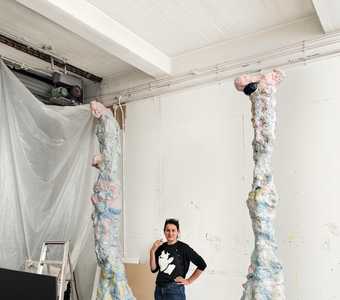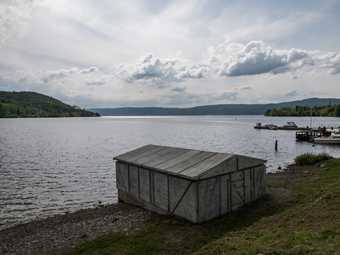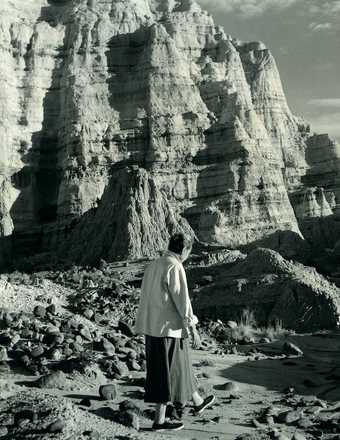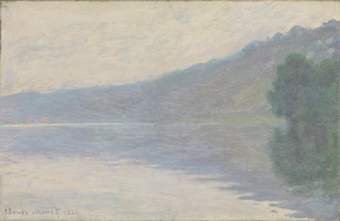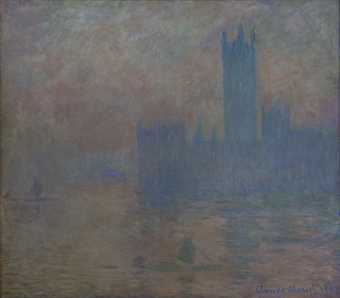
Claude Monet, Houses of Parliament 1903, oil paint on canvas, 81 x 92cm
Le Havre, Musée d'art moderne André Malraux, photo © MuMa Le Havre / David Fogel
Saturday 17 February 1900, 4pm
‘Good day’s work today in spite of the never-ending rain, which stopped me from going to the hospital – to my great regret, because what I have begun there is marvellous to paint and much more interesting than what I have been doing at the Savoy.
‘Anyway, I’m going strong now, although it’s very difficult, for no one day is anything like another: yesterday there was sun, with an exquisite mist and a splendid sunset; today, rain and fog, to the point that I am writing to you by [electric] light at four in the afternoon, whereas yesterday I was able to work in daylight until almost 6 o’clock.’
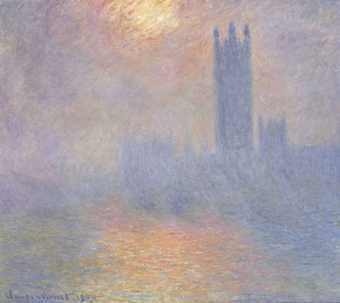
Claude Monet, London, Houses of Parliament. The Sun Shining through the Fog 1904, oil paint on canvas, 81.5 x 92.5 cm
Musée d'Orsay, Paris, photo © RMN-Grand Palais / Hervé Lewandowski
Monday 26 February 1900, 10am
‘Early this morning there was an extraordinary fog, completely yellow; I think I did not too bad an impression of it; it’s always beautiful, in fact, but so very variable that I’ve had to start a lot of canvases of Waterloo Bridge and the Houses of Parliament; I’ve also gone back to several canvases from the first trip, the worst of them. This is where I have been working mostly so far, just going to the hospital at four in the afternoon. Alas, the fog shows no signs of thinning out and I fear my morning is going to be wasted. ...
‘Here comes the sun again, though, is it going to stay this time?’
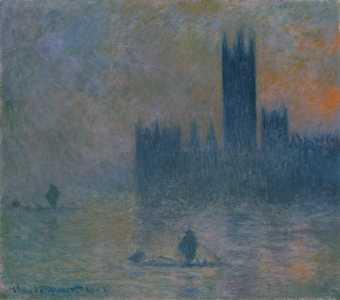
Claude Monet, Houses of Parliament (Effect of Fog) 1903–4, oil paint on canvas, 81.3 x 92.4 cm
The Metropolitan Museum of Art, New York, photo © The Metropolitan Museum of Art, New York
Sunday 4 March 1900
‘I am working very hard, although this morning I really thought the weather had changed completely; when I got up I was terrified to see that there was no fog, not even a wisp of mist: I was prostrate, and could just see all my paintings done for, but gradually the fires were lit and the smoke and haze came back. I took the opportunity to go to Chelsea to see Sargent, who wanted to show me a portrait and get my opinion ... I was back by 11 o’clock, to find my customary weather, with my customary changes: things are moving ahead, but time is moving on too, and that worries me very much.’
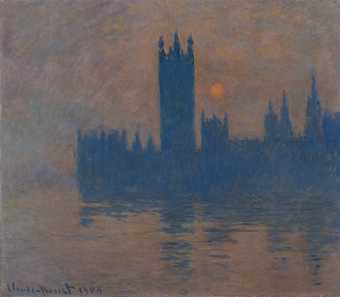
Claude Monet, Houses of Parliament, Sunset 1904, oil paint on canvas, 81 x 92cm
Kunstmuseen Krefeld, photo: Volker Döhne
Wednesday 7 and Friday 9 March 1900
‘... still not a hint of sun nor a break in the clouds, which is a nuisance: there are a lot of things I can’t work on. It’s a shame, because time is moving on and so is the sun, and on the day it does eventually come out it won’t be in the same place. It’s particularly bad as far as my hospital paintings are concerned. I’m sure it has already moved and is no longer setting where my motif is ...’
‘It’s lovely here today and, for a change, the sun is out. Just as I thought, it now sets a good way from where I dreamed of painting it going down in an enormous ball of fire behind Parliament: so I’ll have to forget that idea...’
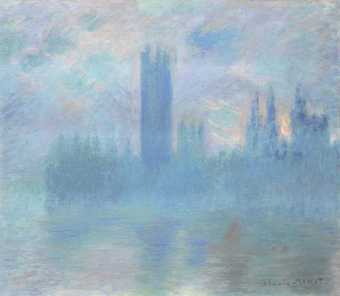
Claude Monet, Houses of Parliament c.1900–1, oil paint on canvas, 81.2 x 92.8 cm
The Art Institute of Chicago, photo © 2017. The Art Institute of Chicago / Art Resource, NY / Scala, Florence
Sunday 18 March 1900
‘Today was a day of terrible struggle, and it will be the same until I leave. Only I need more canvases: there’s no other way to get anything done, than to have different ones going for all kinds of weather, all kinds of harmonies, that’s the real way to do it and, at the beginning, one always expects to find the same effects again and finish them: that’s what leads to these dreadful transformations that are worse than useless.
‘As you see, it’s not enthusiasm that I lack, for I have something like 65 canvases covered with colour and I still need more, this country is something quite out of the ordinary: so I shall have to order more canvases. What a bill I’m going to have from Lechertier’s!’
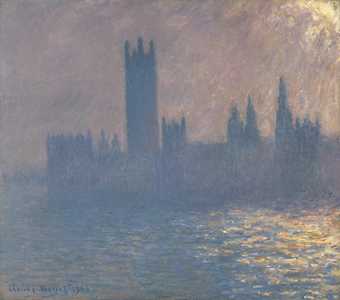
Claude Monet, Houses of Parliament, Sunlight Effect 1903, oil paint on canvas, 81.3 x 92.1 cm
Brooklyn Museum, photo © Brooklyn Museum
Sunday 3 February 1901
‘By 9 o’clock I had already been working on four canvases, although when I got up at six I really thought I was going to have an awful day. As always on Sunday, there wasn’t a trace of fog, it was even an unbelievably clear day: then the sunrise was so dazzling you couldn’t look at it. The Thames was pure gold. Heavens, it was beautiful, and I set to work with a frenzy, following the sun and its glitter on the water. Meanwhile, the kitchen fires were lit; and the smoke from them brought on a haze, then clouds, etc. ...
‘2.30 p.m. I can’t tell you what a fantastic day I’ve had. Wonderful things, but not even lasting five minutes, it’s enough to drive you mad. No, there’s no more extraordinary country for a painter. For the moment it’s dark, and I had to put the light on to scribble down my sensations to you.'
The EY Exhibition: Impressionists in London, French Artists in Exile (1870 – 1904) is on at Tate Britain, 2 November – 7 May 2018.
Letters from Claude Monet to Alice Monet quoted in Sylvie Patin, Claude Monet in Great Britain, translated by Maev de la Guardia, TOTAL/Hazan, Paris 1994.

